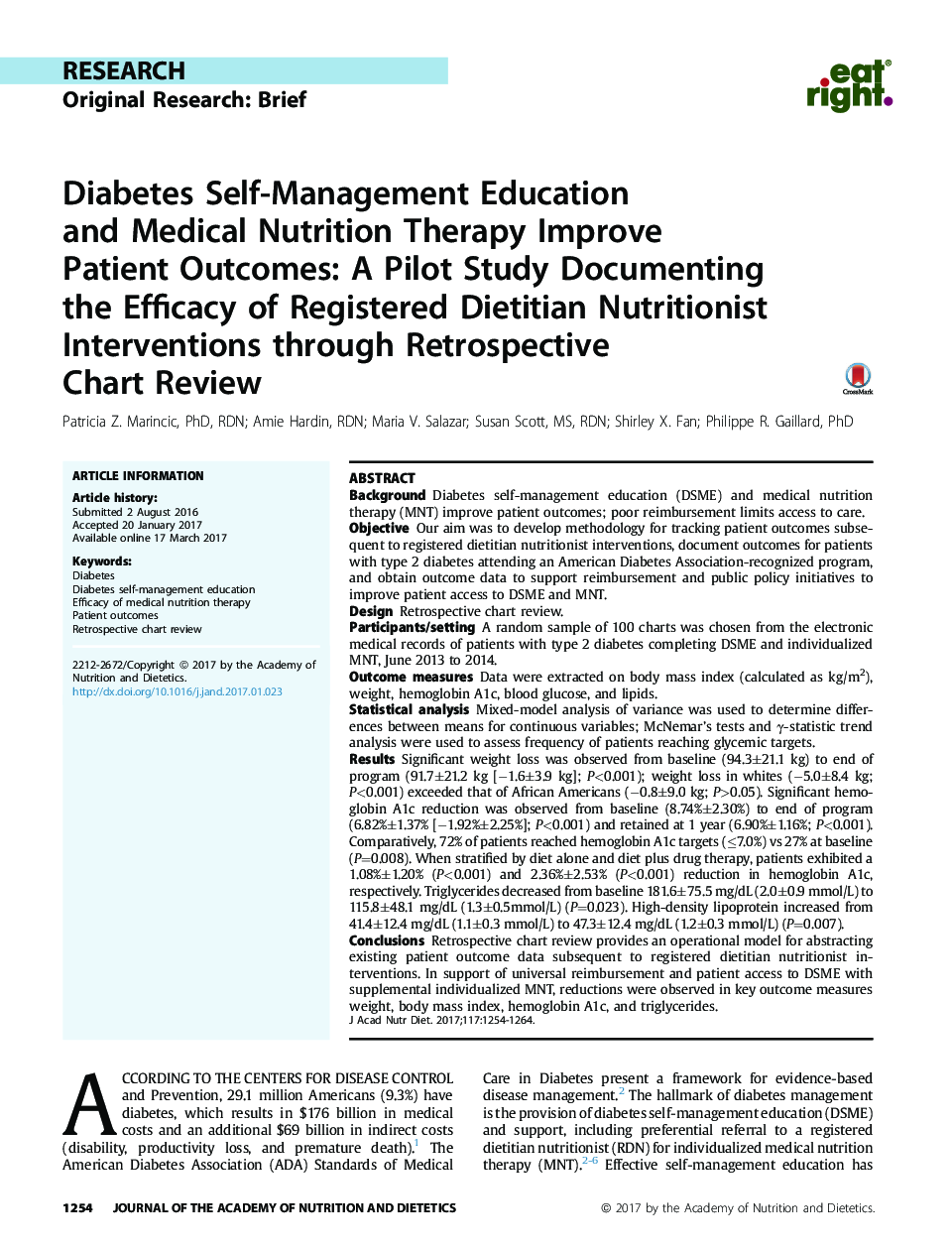| کد مقاله | کد نشریه | سال انتشار | مقاله انگلیسی | نسخه تمام متن |
|---|---|---|---|---|
| 5568994 | 1564021 | 2017 | 11 صفحه PDF | دانلود رایگان |
BackgroundDiabetes self-management education (DSME) and medical nutrition therapy (MNT) improve patient outcomes; poor reimbursement limits access to care.ObjectiveOur aim was to develop methodology for tracking patient outcomes subsequent to registered dietitian nutritionist interventions, document outcomes for patients with type 2 diabetes attending an American Diabetes Association-recognized program, and obtain outcome data to support reimbursement and public policy initiatives to improve patient access to DSME and MNT.DesignRetrospective chart review.Participants/settingA random sample of 100 charts was chosen from the electronic medical records of patients with type 2 diabetes completing DSME and individualized MNT, June 2013 to 2014.Outcome measuresData were extracted on body mass index (calculated as kg/m2), weight, hemoglobin A1c, blood glucose, and lipids.Statistical analysisMixed-model analysis of variance was used to determine differences between means for continuous variables; McNemar's tests and γ-statistic trend analysis were used to assess frequency of patients reaching glycemic targets.ResultsSignificant weight loss was observed from baseline (94.3±21.1 kg) to end of program (91.7±21.2 kg [â1.6±3.9 kg]; P<0.001); weight loss in whites (â5.0±8.4 kg; P<0.001) exceeded that of African Americans (â0.8±9.0 kg; P>0.05). Significant hemoglobin A1c reduction was observed from baseline (8.74%±2.30%) to end of program (6.82%±1.37% [â1.92%±2.25%]; P<0.001) and retained at 1 year (6.90%±1.16%; P<0.001). Comparatively, 72% of patients reached hemoglobin A1c targets (â¤7.0%) vs 27% at baseline (P=0.008). When stratified by diet alone and diet plus drug therapy, patients exhibited a 1.08%±1.20% (P<0.001) and 2.36%±2.53% (P<0.001) reduction in hemoglobin A1c, respectively. Triglycerides decreased from baseline 181.6±75.5 mg/dL (2.0±0.9 mmol/L) to 115.8±48.1 mg/dL (1.3±0.5mmol/L) (P=0.023). High-density lipoprotein increased from 41.4±12.4 mg/dL (1.1±0.3 mmol/L) to 47.3±12.4 mg/dL (1.2±0.3 mmol/L) (P=0.007).ConclusionsRetrospective chart review provides an operational model for abstracting existing patient outcome data subsequent to registered dietitian nutritionist interventions. In support of universal reimbursement and patient access to DSME with supplemental individualized MNT, reductions were observed in key outcome measures weight, body mass index, hemoglobin A1c, and triglycerides.
Journal: Journal of the Academy of Nutrition and Dietetics - Volume 117, Issue 8, August 2017, Pages 1254-1264
